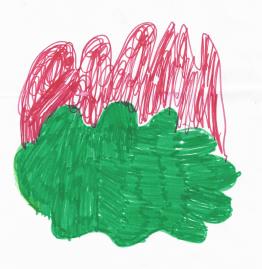God is beginning to bring children to Morton Church again, and recently a 3 1/2 year old noticed the lit candles on the communion table and asked, “Why is there fire up there?” His question inspired this sermon for our Homecoming Service.
Why There’s Fire in the Church
A Sermon on Exodus 3:1-10 and Acts 2:1-21
Homecoming Sunday 2013
During worship two Sundays ago, the burning candles on our communion table caught a child’s eye. He asked, “Why is there fire up there?” What caught Moses’ eye was a burning bush. And whenever you see fire in the Bible, it means that God is around somewhere, and it means that God is up to something. Sometimes, like the church gathered in the upper room, Bible people are expectantly waiting for the fire. For others, like Moses, the fire comes to them as a complete surprise.
The day Moses first saw the fire started out just like any other work day. Moses was out in the fields of Midian, doing what he did every day: keeping track of a flock of sheep. Suddenly, there on the horizon that he had scanned countless times before, he noticed something different. “That’s odd,” Moses said to himself. “That bush is on fire, but it’s not getting burned up. Wow! I’ve got to go take a closer look!”
There! God had Moses’ attention, and the next thing you know, God was relighting an old passion in Moses. “Don’t come any closer,” God said when God had Moses’ attention. “Take off your shoes. You’re on holy ground here!”
God then proceeded to pour out what was in God’s heart. “I’ve seen the terrible suffering of my people in slavery in Egypt,” God said. “I’ve heard every one of their cries. I know how miserable they are.”
Moses knew it, too. He had seen it and heard it, too. Years ago Moses had killed an Egyptian that he saw beating an Israelite, and that’s what led him to run away from Egypt and immigrate to Midian. Doggone right Moses knew what God was talking about!
“I’m going to get them out of there and lead them to a new homeland,” God continued. “And so, I am sending YOU as my agent. You’re going down to Egypt, you’re going to tell Pharaoh to let my people go, and you’re going to get them out of there.”
Shocked, Moses proceeded to argue with God about why he was a poor choice for this job, and why God really ought to send somebody else. Eventually, though, Moses quit objecting and headed for Egypt. Despite himself, Moses found his heart on fire again, and soon he found himself face to face with the king of Egypt, right in the heart of the oppression and pain of the Hebrew people, calling for justice in the name of God.
The group gathered in the upper room in Jerusalem was a small church with a big task ahead of it. “You’re going to be my witnesses,” Jesus had told them, “starting here at home in Jerusalem, and in all Judea and Samaria, and to the ends of the earth. And when the Holy Spirit comes on you, you are going to get the power to do it.” The fire was on the way.
As the church talked and prayed and waited, a fly on the wall might have heard something like this: “How are we going to manage this? I mean, look at us! Where do we start? What do we say? What about the people who don’t speak our language? And we know this is going to get us in trouble just like it got Jesus in trouble. What will we do then?” You can bet there was some big time praying going on in the upper room, along with Bible study and telling and retelling the stories of Jesus.
The Day of Pentecost found Jesus’ followers together. This time, God didn’t come quietly. God didn’t slip in on the horizon and wait for them to notice. This time the Spirit of God swooped in like a fierce wind, and fire appeared among them and rested on them. In pictures of this event, Jesus’ followers often look like human candles with flames above their heads. And no, they didn’t get burned, either!
Next thing you know, they’re outside of the upper room telling everybody about Jesus, telling everybody about the wonderful things God does. It happened to be homecoming time in Jerusalem then, too. Lots of people from all around the known world were there. They were amazed when they heard the members of the church telling God’s story in their native languages. The Spirit had given the church the ability to speak the languages of the people on the outside who didn’t know Jesus yet.
The whole city knew something was going on. (more…)




